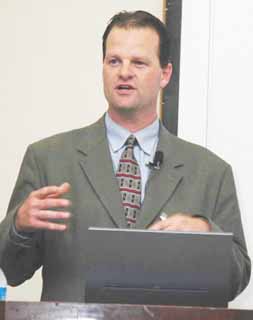U.S. veteran speaks in Hiroshima about the health effects of depleted uranium
May 22, 2008
by Nobushige Sakai, Staff Writer
Dennis Kyne, 38, a U.S. veteran who served in the Gulf War of 1990-1991 and is now a peace activist living in California, spoke about the health consequences caused by depleted uranium, used in weapons during the conflict, in a talk at Aster Plaza in downtown Hiroshima on May 18. He revealed the fact that soldiers became ill on the battlefield and continue to suffer today from the aftereffects of this substance.
The Hiroshima Medical Practitioners Association hosted the event and 75 people were in attendance. Mr. Kyne told the audience that “As we marched into Iraq from Saudi Arabia, the soldiers in my unit experienced vomiting and diarrhea and became incapable of fighting.” After returning to the United States from Iraq, Mr. Kyne suffered from poor health for the next five years.
Mr. Kyne also mentioned that his brother-in-law, who served in Iraq during the Gulf War, too, has since experienced a serious respiratory disorder and chronic fatigue. “He can't work,” Mr. Kyne explained, “so he has to make ends meet with compensation from the government.”
At the same time, the U.S. government denies a causal link between the depleted uranium used in weapons and the symptoms shown by veterans. Mr. Kyne contends that “The United Nations should ban the use of depleted uranium. And health care for U.S. veterans and Iraqi civilians is badly needed, too.”
Dennis Kyne, 38, a U.S. veteran who served in the Gulf War of 1990-1991 and is now a peace activist living in California, spoke about the health consequences caused by depleted uranium, used in weapons during the conflict, in a talk at Aster Plaza in downtown Hiroshima on May 18. He revealed the fact that soldiers became ill on the battlefield and continue to suffer today from the aftereffects of this substance.
The Hiroshima Medical Practitioners Association hosted the event and 75 people were in attendance. Mr. Kyne told the audience that “As we marched into Iraq from Saudi Arabia, the soldiers in my unit experienced vomiting and diarrhea and became incapable of fighting.” After returning to the United States from Iraq, Mr. Kyne suffered from poor health for the next five years.
Mr. Kyne also mentioned that his brother-in-law, who served in Iraq during the Gulf War, too, has since experienced a serious respiratory disorder and chronic fatigue. “He can't work,” Mr. Kyne explained, “so he has to make ends meet with compensation from the government.”
At the same time, the U.S. government denies a causal link between the depleted uranium used in weapons and the symptoms shown by veterans. Mr. Kyne contends that “The United Nations should ban the use of depleted uranium. And health care for U.S. veterans and Iraqi civilians is badly needed, too.”








